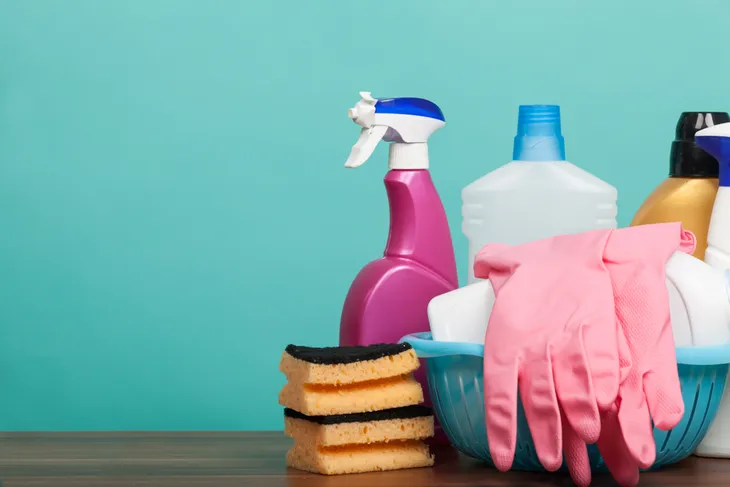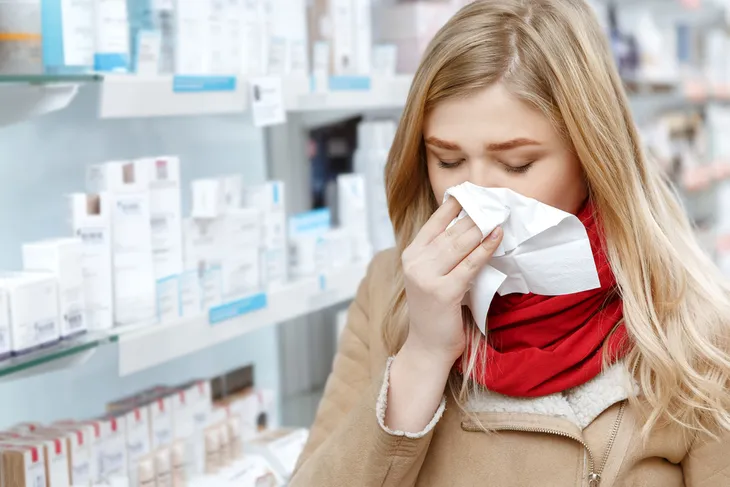It’s that time of year again, when the flu virus makes its annual rounds. If you end up being one of the lucky people who doesn’t get sick this season, then you’ll probably know someone who does. It’s pretty hard to escape, especially if you live with children or frequent high traffic places like gyms, schools, hospitals, or use public transit.
Each one of us is bound to come in close contact with the flu virus at some point this season, but the key is how we protect ourselves against it which means following the proper precautions and etiquette. To avoid getting sick this winter, take note of these easy flu prevention tips…
1. Get Your Flu Shot
Every year the debate about whether or not to get the flu shot resurfaces. It’s unfortunate that people even question whether or not to get it, but sadly, it happens and it’s due to a lot of misinformation or misconception about the vaccine and its effects. The truth is, the flu vaccine not only protects you from potentially contracting the flu, but it also prevents others around you that might be more susceptible to getting sick, like children or seniors. It also protects those who are unable to get the flu shot like newborn babies.
A lot of the misconception about the flu shot stems from people not understanding how it works. There is a new flu vaccine each year and while it can never be 100-percent effective because there are so many different strains of the flu and the vaccine is developed ahead of the season, it gives us the best odds at protection. When someone gets the flu vaccine, their body releases antibodies to fight against the most common strains so that they are prepared for the upcoming season. The best time of year to get the flu vaccine is in October because the flu peaks between November and March, but it’s a good idea to get the flu shot at any point because a flu season can last all the way until May.
2. Stay Away From Others Who Are Sick
This one seems obvious, but you’d be surprised how many people still interact with friends and family members who are sick. The flu is extremely contagious and easily passed from person to person, especially if that sick person is sneezing and coughing into the air around them. According to the Centers for Disease Control and Prevention (CDC), the flu virus can travel up to 6-feet through the air from small droplets that are released when someone sneezes, coughs, or talks.
The same advice goes for those who are sick…stay at home! Even something as innocent as running errands or going to school can put others at risk. The biggest conundrum is people who are sick and most likely still contagious that go into work. These are the people who don’t want to “waste” their sick days or fall behind on work, but sick days are there for a reason, so use them! The CDC advises people to stay home for at least 24 hours after the fever is gone (without the use of a fever-reducing medicine).
3. Don’t Touch Your Face
A lot of people, myself included, have picked up the bad habit of touching their face. It tends to occur more when people are tired or stressed, especially at work. Unfortunately, this is also one of the biggest risk factors for contracting the flu virus. The CDC warns that germs are spread “when a person touches something that is contaminated with germs and then touches his or her eyes, nose, or mouth.”
Thankfully the virus isn’t passed through skin contact, so technically a person can’t get the flu from touching a contaminated surface and then their skin. But rather it’s transferred through mucosal membrane in the mouth or nose, so if you were to touch your mouth, nose, or rub your eyes immediately after touching an infected surface or person, then you’d be transferring the virus directly into your system.
4. Keep Communal Surfaces Clean
Cleanliness is always necessary for health, but during the flu season it’s more important than ever to clean communal surfaces in the home, at work, or in a school. Especially if someone who frequents this space is sick. The CDC warns that the flu virus can live on certain surfaces for up to 48-hours.
The best form of prevention is to avoid sick people, but it’s not always possible, especially if that sick person lives with you. Remember it’s also never a guarantee that a sick person hasn’t unintentionally spread their germs on any surfaces. Dr. Adalja, MD, an infectious disease physician, spokesperson for the Infectious Diseases Society of America, and senior scholar at Johns Hopkins University for Health Security told Cosmopolitan that approximately 25-percent of people who are infected and contagious don’t get any symptoms which means they won’t know to take precaution when it comes to spreading the virus. “Going above and beyond to clean surfaces in still isn’t an iron-clad way to avoid the flu, because there are so many opportunities for the virus to spread directly between humans in a shared environment,” he adds. It’s better than nothing!
5. Wash Your Hands
Similar to cleanliness, hand washing is always important, but it’s even more necessary during the cold and flu season. “Flu and other serious respiratory illnesses, like respiratory syncytial virus (RSV), whooping cough, and severe acute respiratory syndrome (SARS), are spread by cough, sneezing, or unclean hands,” says CDC.
If you’re extra cautious, keep some hand sanitizer on hand for whenever you’re out in public places that could have germ covered surfaces like the subway station, restaurants, gyms, etc. You never know if or when a sick person has passed through, and it’s best not to assume they are following the proper precautions when it comes to sneezing, coughing or even washing their hands.
6. Wear Surgical Gloves When Caring For Someone
Even though we already previously mentioned that you should keep your distance from anyone who is sick, this isn’t exactly possible if that sick person is an elderly parent or a young child. They need to be taken care of. Even though the person you are caring for is the one whose needs seemingly come first, you still need to take care of yourself. Think of it this way, you can’t care for someone else if you’re not well yourself!
In a hospital or clinic, the doctors and nurses wear disposable gloves and surgical masks to avoid getting sick or coming into contact with contaminated secretions and surfaces. You should do the same. If you don’t have access to disposable gloves or don’t want to go buy any, just make sure you are constantly washing your hands. And remember: in order to completely rid your hands of any viruses, you need to scrub your hands for at least 20 seconds or more. You’d be surprised how many people do not wash their hands for the proper amount of time.
7. If Prescribed, Take Antiviral Drugs
The CDC list three important actions for fighting the flu and one of these is to take antiviral drugs (if your doctor prescribes them). The source explains that antiviral drugs are different from antibiotics because they are prescribed by a doctor and cannot be purchased over-the-counter. While they won’t cure the flu, they will ease the symptoms, prevent complications, and help speed up the recovery process so that the illness duration is shorter.
8. Designate a Sick Room
If someone you live with is sick with the flu then you need to do your best to prevent you and the rest of your family from getting sick. One of the best ways to do that is to designate a sick room. This is a room that the person with the flu stays in unless they need to go to the bathroom or to a doctor’s appointment, says the CDC.
Some things you should try and have stocked in the sick room are facial tissues, hand sanitizer, thermometer, water, humidifier, and any necessary medication. By containing the person with the flu in one room you are lessening the chances of the virus spreading throughout the household.
9. Keep Your Belongings Separate
Sharing is caring, but during the flu season it’s okay to be a little stingy on this rule. The CDC warns that the flu virus can live on a surface for up to 48-hours. “That leaves plenty of time for germs to spread among family members. Just one sick child can pass an illness on to an entire family in the right setting,” says Healthline.
While it might seem like overkill, it’s necessary! And we’re pretty sure that sick person will understand that you don’t want to risk catching whatever it is they are suffering from! Healthline advises keeping personal belongings like toothbrushes, towels, children’s toys, utensils, and drinking glasses tucked away or out of sight so that they cannot become easily contaminated. If you suspect something has come in contact with the flu virus, wash it in hot soapy water.
10. Do Your Own Dishes
We’ve already mentioned that staying healthy can be extremely difficult if you’re living in the same house as someone who is sick. So what can we do to help in that situation? Well for starters, take extra precaution to keep the virus contained, especially when it comes to the consumption of food, food prep, and even washing dishes. “It’s very difficult to completely avoid flu exposure when you’re living in the same household as someone who is infected,” says Dr. Adalja to Cosmopolitan.
To help prevent the virus from spreading between family members or roommates, you should do your own dishes and definitely don’t share a plate of food. You don’t want anything that has been in a sick person’s mouth to end up near something that will be going near yours!
11. Relax!
Sleep is one of the best things a person can do to keep themselves healthy and in good shape to fight off illnesses. “Having adequate sleep is a good habit for optimal immune system functioning and to prevent respiratory viruses like the flu,” says Dr. Adalja to Cosmopolitan. According to the National Sleep Foundation, the average adult needs about 7 to 9 hours of sleep each night.
In addition to sleep, you should also try to keep your stress levels to a minimum by getting regular exercise, eating healthy, and making time for relaxation. Cosmopolitan cites a 2009 review of 13 existing studies published in Brain, Behavior, and Immunity which showed that people who were psychologically stressed were less likely to develop the necessary antibodies to respond with the flu vaccine.
12. Quit Smoking
Another healthy lifestyle tip to help prevent the flu is to quit smoking. Not only does smoking increase a person’s risk of developing cancer and premature aging, it also weakens the immune system.
WebMD points out that research proves “smokers get the flu more often than people who don’t light up. And when they do get sick, smokers tend to have a more severe infection and a higher risk of dying from the flu.” You should also avoid drinking alcohol if you’re sick because it will only prolong the recovery process.















